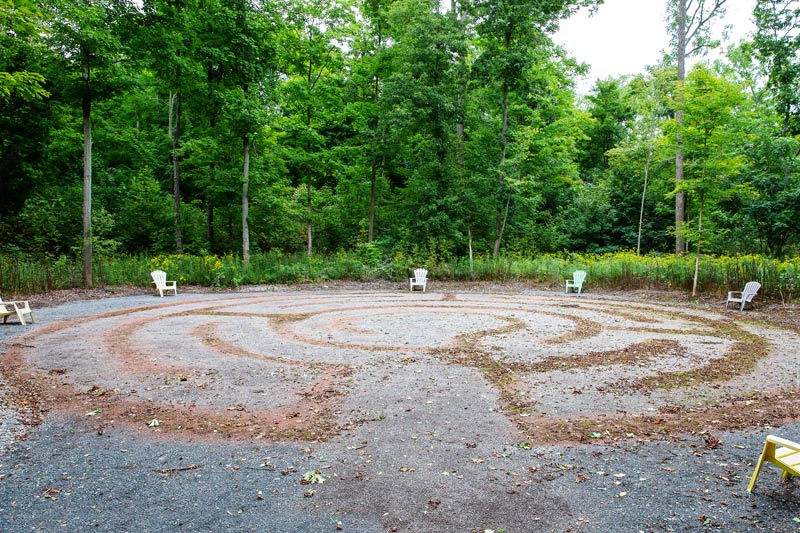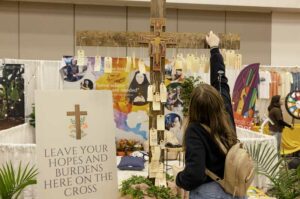
In the southern Ontario’s Niagara Region, you’ll find Jericho House, a prairie style, wheelchair-accessible building inspired by the designs of Frank Lloyd Wright. Its abundance of windows invite the surrounding forest into its interior. The outdoor labyrinth has four circuits, with crushed two-coloured gravel and is surrounded by 15 acres of Carolinian forest.
Felician Sr. Mary Jacqueline Keefe tells about taking a group of teenage guests out to the labyrinth a few years ago, after a fresh snowfall. One of the young women exclaimed, “Oh, Sr. Jacquie, I didn’t know that deer prayed!” She had seen hoofprints on the labyrinth and made the innocent assumption that deer were following the path of contemplation. “Her observation was so beautiful, I almost cried,” remembers Sr. Jacquie.
Franciscan Spirituality
If there is a place where animals pray, it might be Jericho House, where Franciscan spirituality infuses the retreat center with a sense of one-ness with creation. This ecumenical and interfaith center for youth and adults, constructed in the shape of a San Damiano cross, offers education in leadership, social and ecological justice, and spirituality. The staff’s practice of hospitality creates an inclusive and supportive experience, based on a model of companionship.
“We don’t have a book of answers,” says Br. Bill Carrothers, Edmund Rice Christian Brother, and co-director with Sr. Jacquie of Jericho House. Instead, our guests enter into relationships with themselves, others and God.
Accompaniment Method
Sr. Jacquie and Br. Bill have worked together for more than 30 years, so while they may not have a “book of answers,” they do have a well-established method for accompaniment. They like to start with the story of the blind person at Jericho from Mark’s gospel – the story that gave Jericho House its name. In the story, the blind beggar calls out to Jesus, asking for mercy. Rather than responding with authority or power, Jesus simply asks, “What do you want me to do for you?” The blind man asks for his sight, and Jesus, acknowledging his faith, tells him that his faith has healed him. He enters into a relationship, trusting and loving the other person.
When Sr. Jacquie and Br. Bill lead retreats and leadership conferences at Jericho House, they invite all to participate, listen and share. All of the rooms have large windows, to connect people to the outdoors at all times. There is no podium or “front” of the room. “We seldom stand,” explains Br. Bill. “We work in circles where there is no beginning or end, no first or last.” By de-centering authority, Sr. Jacquie and Br. Bill establish trust with the participants, helping them to see the ways they are loved and called by God. Young people who experience this kind of dignity can recognize their ability to become leaders, take that knowledge from Jericho House and bring it into their communities.
Sr. Jacquie emphasizes that what people experience at Jericho House should not be distinct from their everyday experiences. “God is in our wonderful, ordinary humanity. Retreating and coming to an oasis is not separate from our lives. It’s part of living. It’s not being in the world in one place and being with God in the other. It’s together. It’s whole. It’s a relationship.”
Perhaps the labyrinth best represents our journeys. The predictable, circular path frees you from distractions, to focus on your relationship with God. And learning to walk with God helps you to connect with other people, in relationships founded in respect and mutuality.
To learn more or attend an upcoming retreat, visit the Jericho House website.




